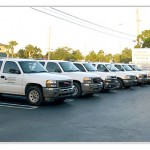Categories
 The Fleet Management Department in the city of New Orleans, LA, is revising its city employee take-home vehicle policy. The Fleet Management Department is significantly reducing the number of take-home vehicles for city employees, according to a statement from Mayor Mitch Landrieu. As the city faces a huge budget shortfall, take-home cars have been a recurring topic under scrutiny. The new policy, according to Landrieu, reduces the total number of fleet vehicles from 937 to 473, effective Sept 1, 2010. Starting right away, the extra 464 vehicles will now only be used during regular business hours or auctioned off, according to the mayor’s office.
The Fleet Management Department in the city of New Orleans, LA, is revising its city employee take-home vehicle policy. The Fleet Management Department is significantly reducing the number of take-home vehicles for city employees, according to a statement from Mayor Mitch Landrieu. As the city faces a huge budget shortfall, take-home cars have been a recurring topic under scrutiny. The new policy, according to Landrieu, reduces the total number of fleet vehicles from 937 to 473, effective Sept 1, 2010. Starting right away, the extra 464 vehicles will now only be used during regular business hours or auctioned off, according to the mayor’s office.
The new policy also eliminates take-home fleet vehicles for those living 40 miles or more outside of New Orleans, “as it is impractical for them to respond to on a 24 hour basis in a timely manner,” said the statement from the mayor’s office.“We are changing the way business is done at City Hall,” said Landrieu. “The revised policy will save hundreds of thousands of dollars annually and is just another way we are streamlining government, eliminating waste and more effectively managing city assets.”
“We’re spending a lot of money paying for fuel, paying for costs associated with driving people to and from work everyday in city owned vehicles,” said Andy Kopplin, deputy mayor. “That’s an expense we can’t afford.” Landrieu, however, said in the statement that New Orleans police officers who live in Orleans Parish will still be allowed to take their vehicles home since they provide a crime deterrent for their neighborhoods.
“A take-home vehicle is a tool for folks to use in effectively carrying out their jobs,” said Andy Kopplin, Deputy Mayor and Chief Administrative Officer. “A take-home vehicle is not a perk for upper management; it’s not for people who don’t need one. The city is in a financial position that we just can’t afford to do those sorts of things anymore.”
As many cities struggle to cut costs without jeopardizing the safety and well being of citizens, the number of city owned fleet vehicles and equipment is being questioned. A GPS fleet tracking system can help any city to determine the optimal size of its fleet. A GPS fleet system tracks critical vehicle data enabling fleet managers to quickly and easily gain valuable insight into fleet activities.
There are several ways for government’s to achieve cost savings by reducing the size of its fleet. Money can be derived from:
sales of current fleet vehicles
the avoidance of replacing unnecessary fleet vehicles
the avoidance of maintaining unnecessary fleet vehicles
the avoidance of fueling and operating unnecessary fleet vehicles
Taking cars off the road is a good idea for any fleet. Not only does it cut costs, but it can also reduce harmful vehicle emissions. In light of the recent environmental disasters in the Gulf of Mexico near New Orleans, it is more important than ever for the city to reduce its negative environmental impact. A GPS fleet tracking system can significantly help fleets of any size reduce costs, increase productivity and go green at the same time.






